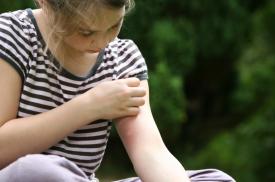
SMART STEPS FOR BETTER HEALTH DURING YOUR RV TRAVELS
Wash hands thoroughly and often. Germs can be quickly transferred from contaminated surfaces to your hands with a passing touch. Avoid the spread of infectious diseases by regularly washing your hands with soap and clean water. Always wash up before meals and after touching doorknobs, railings, counters, shopping carts or other surfaces in public places. Keep a small container of hand sanitizer with you for use when there are no washing facilities nearby.
Keep active. By nature, RVing tends to involve a lot of time sitting as you drive between destinations, so set aside some time each day for physical activity. Take in the views with an invigorating walk or hike, traverse the local waters in kayak or canoe, or explore your RV resort by bike. Staying active helps keep your body fit, your muscles toned, and your endurance level high. It’s also a great way to burn off calories from indulgent meals or campfire s’mores.
Prevent insect bites and stings. Mosquitoes and other biting insects can spread dangerous illnesses such as the Zika virus, malaria and dengue. Have insect repellant handy if you’ll be spending time outdoors, use mosquito coils or a ThermaCELL® device to protect your RV campsite, and follow other practical tips for preventing mosquito bites. Also, avoid leaving open cans of soda or other sweets out, as they can attract stinging bees, wasps, hornets and yellow jackets. If you do get bitten or stung, you can treat the itchiness and swelling with an over-the-counter antihistamine (look for one with diphenhydramine or chlorpheniramine), hydrocortisone cream or calamine lotion.

Stay hydrated. RVers are frequently on the go—whether it’s a busy schedule of sightseeing or a long day of hiking—and can sometimes forget to maintain proper fluid intake. Dehydration can cause a host of problems, from headaches to fever, or even unconsciousness in severe cases. Be sure to drink plenty of water throughout the day, and carry extra when you’re hiking. Whenever you refill a water bottle, canteen or your RV water tank, make certain your water source is potable (safe for drinking).
Stay flexible. If your travel plans involve hiking through parks or forests, prepare your body for the trek ahead. Improving your flexibility can help prevent the falls and sprains that commonly occur on uneven terrain. Start each day with a simple series of stretches, squats and lunges to loosen tight muscles and keep your body limber.
Practice good RV galley hygiene. Don’t let cleanliness lapse when you’re on vacation; maintain the same sanitation standards while RVing as you do at home. Wash all cooking gear, dishes and utensils thoroughly with dish soap and warm water, and clean countertops and dinettes with sanitizing wipes. When preparing meals in a snug RV galley, take special care to keep raw meat and poultry away from fruits and vegetables to avoid salmonella. To prevent spoilage and food poisoning, place perishable ingredients back in the fridge when you’re done cooking and refrigerate any leftovers as soon as you’re done eating.

Plan healthy meals. Make an effort to eat nutritionally balanced meals during your RV travels, since frequent stops at fast-food restaurants or a pantry filled with processed food can wreak havoc on your health and waistline. Instead of stocking up on packaged foods, purchase locally harvested produce from farmer’s markets and farm stands in each town you visit. Get creative with your farm-fresh finds; toss a salad, grill some marinated veggies or whip up a stir-fry.
Watch out for wildlife. When camping in national parks or other wooded locations, be aware of the local wildlife and always heed any posted restrictions or warnings. Bears, raccoons and other woodland creatures have been known to scavenge around campsites looking for an easy meal, so be careful of how and where you store your food and garbage. Avoid touching even docile-looking animals, as they could carry rabies or ticks.
Apply sunblock. Not only can a painful sunburn hamper your comfort during your RV travels, but the cumulative effects of sun damage can lead to skin cancer. Whenever you head outdoors, apply sunscreen with an SPF of 15 or higher (many experts recommend a minimum of 30 SPF) on your face and all exposed skin. You should also wear a sunhat to protect the delicate skin of your face, ears and scalp. Reapply sunblock several times throughout the day during prolonged sun exposure, particularly after swimming or sweating.

Don’t forget your medications! If you take prescription medications, vitamins or supplements, be sure to carry a sufficient supply for the duration of your RV travels plus some extra doses in case you experience any delays in your return journey. Remember to pack commonly used over-the-counter medications such as pain relievers and allergy tablets as well as first-aid ointments, antiseptic and bandages. It’s also a good idea to bring a list of your medications, allergies and health conditions with you in case of illness or injury, since local doctors won’t have immediate access to your health records. Keep this list in your wallet, handbag or daypack along with your emergency contact information.
Following these health tips can help minimize downtime while you’re RVing and keep the good times rolling for years to come!



